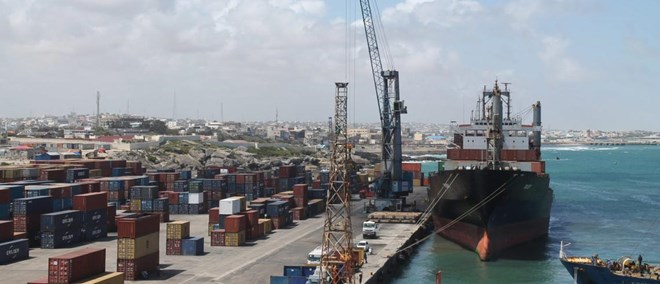
Wednesday October 14, 2020

The watershed deal could lead increased revenues and the preservation of Somalia's sovereignty, especially after nearly a decade of Emirati support for separatist groups that undermined Mogadishu’s federal reach.
Somalia's federal government signed a landmark 14-year contract with a Turkish company, handing it over the charge of running and rebuilding its capital Mogadishu’s port, according to the country's National Television.
While the deal followed days of discussion on profit-sharing, the move is one of many Somalia has taken to ensure its sovereignty in terms of expanding its federal budget and countering interference from the UAE.
Ports and Marine Transport Minister Mariam Aweys Jama told the media that the deal would lead to significant investments into the port’s facilities, and boost trade for the nation.
Somalia is strategically situated on the Horn of Africa, which is the only natural strait to the Arabian Red Sea. On the other end, is the notable Suez Canal. Nearly 40 percent of global trade passes through this maritime corridor. The deal is only the latest in a series of strategic partnerships undertaken by the two nations. Turkey has also built a medical research hospital in Mogadishu, and rebuilt the Aden Adde International Airport.
UAE encroachment
The port at the heart of the deal was previously managed by an Emirati company, before major pushback from Somalia’s federal authorities brought the deal to a halt.
The government backlash came after the Emirati-owned company DP World signed a 30-year deal with Somali autonomous region Puntland in 2017 to build a new port, followed by an investment of $442 million in October 2018 in another port to be based in separatist-state Somaliland.
Both moves came in an attempt to undermine Somalia's pro-Turkey federal government, which had signed a defence partnership agreement with Turkey that saw the construction of a Turkish military base and defence university in 2017. The base was geared to build Somalia’s military capacity in combatting terrorism.
To counter this, the UAE also began the construction of a military base and airport in the port city of Berbera, with an agreement to control it for 30 years before relinquishing it to the separatist state. Berbera is only 300 km south of Yemen, where a Saudi-led coalition inclusive of the UAE has been fighting a war with disastrous civilian casualties since 2015.
After major pushback the deal was scrapped in 2019, and the military airport was converted for civilian use.
The UAE’s support for autonomous regions has come under fire for weakening Somalia’s authority, while asserting dominance over its ports in Somaliland and Puntland.
In keeping with this direction, the UAE also supports and finances candidates such as former Somali Prime Minister Omar Abdirashid Sharmarke, and opposition figure Abdirahman Warsame.
The UAE has "bankrolled various mercenary groups engaged in various clandestine operations that ultimately sustain [Somalia's] status quo," says Abukar Arman, who served as Somalia’s former Special Envoy to the United States.
In a bid to regain its own sovereignty, Somalia called on the United Nations Security Council to halt the UAE’s construction of a military base in Somaliland, citing “a clear violation of international law,” while lambasting the UAE’s deal with a local government that bypassed the authority and approval of Somalia’s federal government which violates its constitution.
Funding terrorism
According to the UN, Charcoal smuggling to Gulf states accounts for nearly $7.5 million in taxes collected by the terrorist group al-Shabab. Black market Somali charcoal exports are worth around $150 million a year in the UAE alone.
Charcoal is traditionally used for burning incense, among its more common usages. To eliminate the funding of terrorism, the UN issued a ban on charcoal exports from Somalia in 2012, backed by the Somali Federal Government. The decision was also supported internally to mitigate the charcoal trade’s environmental damage and further desertification, with its significant impact on drought and agriculture.
In spite of the ban, the illegal charcoal trade has seen a resurgence since 2018, with smugglers bypassing sanctionings by forging origin certificates claiming the goods come from other East African states.
Faced with the UN report which revealing the UAE’s complicity in the illegal illicit trade, the Gulf state made no comment and failed to implement any measures to prevent further financing of terrorism. This was widely seen as a snub at pro-Turkey former Somali Prime Minister Abdullahi Mohamed.
Strategic partnership
Throughout the escalating crisis however, Somalia and Turkey have witnessed increasing trade ties.
Bilateral trade between the two countries amounted to $206 million in 2019, up from $144 million in 2017.
Turkey’s President Recep Tayyip Erdogan was the first non-African leader to visit Somalia in 20 years, arriving in a state delegation in 2017. His trip coincided with the inauguration of Turkey’s military base in Mogadishu, built with the aim of training 10,000 Somali soldiers.
Turkey has also participated in building roads and fisheries in Somalia, opening flights to Somalia twice a week, and brokering talks between Somalia and the unilaterally autonomous region of Somaliland.